Studies show that 68% of urban dwellers lack access to private gardens, making balconies their primary connection to nature. You’ll discover how to transform your elevated outdoor space into a sophisticated retreat using carefully selected trees that thrive in containers. From the sculptural Japanese Maple to the aromatic Dwarf Eucalyptus, each specimen offers unique benefits for small-space gardening while maintaining an upscale aesthetic. Let’s explore these architectural elements that can elevate your balcony from basic to luxurious.
Contents
- 1 Japanese Maple: A Sculptural Masterpiece for Small Spaces
- 2 Meyer Lemon: The Perfect Blend of Beauty and Function
- 3 Dwarf Olive Tree: Mediterranean Elegance Above the City
- 4 Star Magnolia: Fragrant Blooms for Your Urban Retreat
- 5 Italian Cypress: Vertical Drama for Modern Balconies
- 6 Dwarf Cherry Blossom: Spring’s Most Graceful Performance
- 7 Bay Laurel: The Culinary Crown Jewel
- 8 Chinese Bamboo: Creating Natural Privacy Screens
- 9 Dwarf Eucalyptus: Contemporary Appeal With Aromatic Benefits
- 10 Kumquat Tree: Petite Citrus Charm Year-Round
Japanese Maple: A Sculptural Masterpiece for Small Spaces
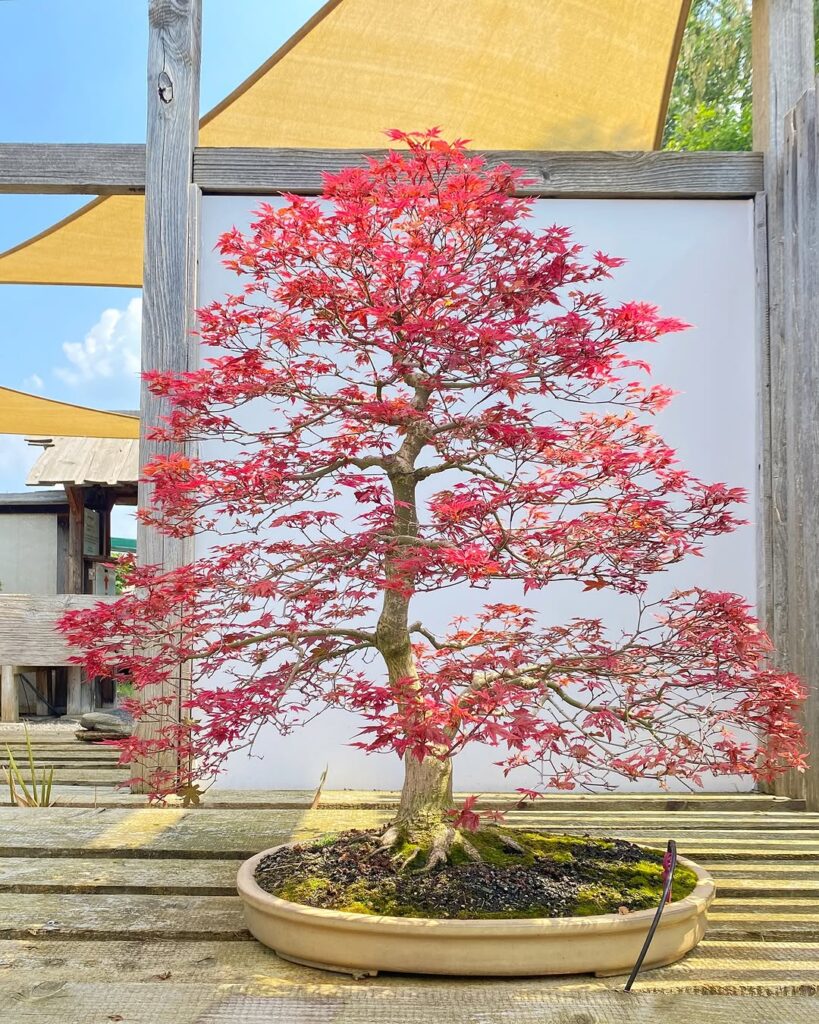
The Japanese Maple (Acer palmatum) is a stunning ornamental tree that brings grace and artistry to balcony spaces with its delicate, lacy foliage and compact growth habit. Its naturally sculptural form and seasonal color changes – from spring’s bright greens to summer’s deep burgundy to autumn’s brilliant reds and oranges – make it an ideal focal point for small outdoor areas. When properly maintained through careful pruning, dwarf varieties can thrive in containers while maintaining a manageable size that suits balcony constraints.
- Light: Partial shade to filtered sun; protect from intense afternoon sunlight
- Water: Consistently moist but not waterlogged soil; increased watering during hot periods
- Soil: Well-draining, slightly acidic soil rich in organic matter
- Temperature: Thrives in USDA zones 5-8; protect from harsh winds
- Container: Large pot with adequate drainage holes; minimum 20 inches deep
- Humidity: Benefits from moderate humidity levels; mist foliage during dry periods
- Fertilizer: Light feeding with balanced, slow-release fertilizer in spring
- Pruning: Light pruning in late winter to maintain shape and size
Meyer Lemon: The Perfect Blend of Beauty and Function
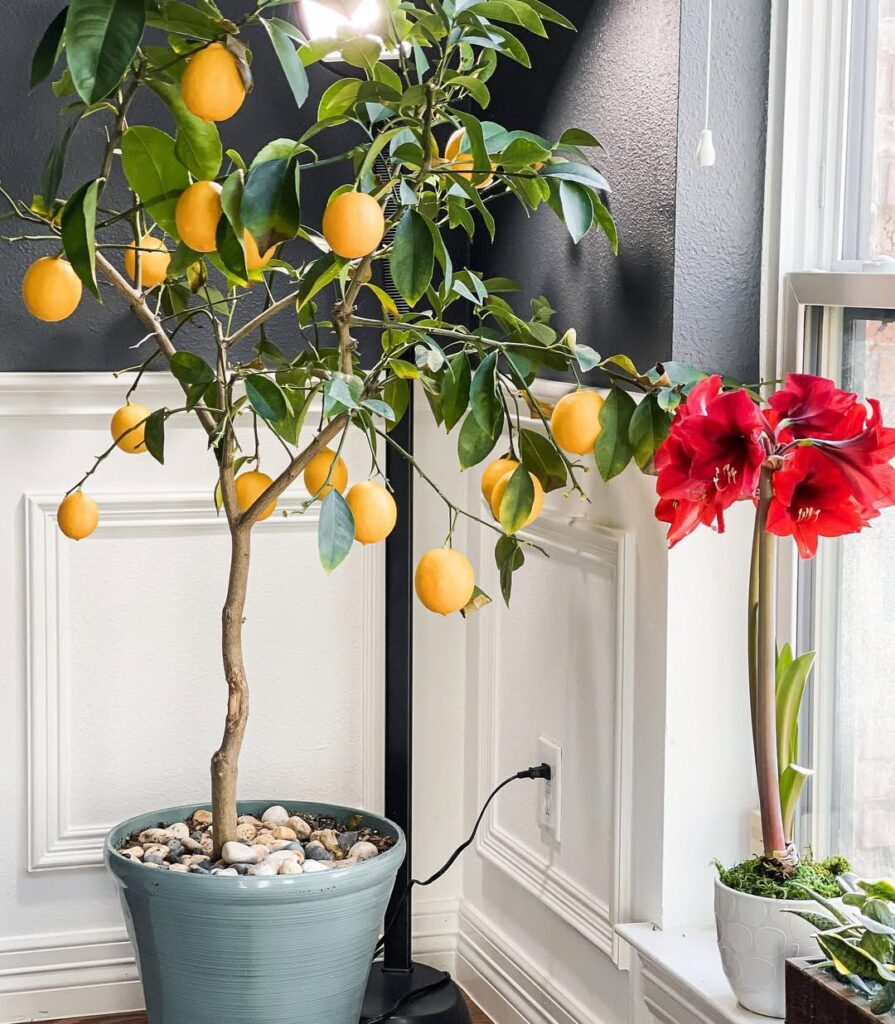
Meyer Lemon trees are compact citrus varieties that thrive exceptionally well in balcony settings, making them an ideal choice for urban gardeners. These trees produce sweeter, less acidic fruits than standard lemons and feature glossy evergreen leaves alongside fragrant white blossoms that perfume the air. Not only do they serve as attractive ornamental plants, but they also reward growers with homegrown citrus fruits that can be harvested year-round once established.
- Light: Requires 6-8 hours of direct sunlight daily; south or west-facing exposure is optimal
- Water: Keep soil consistently moist but not waterlogged; water when top 1-2 inches of soil feels dry
- Soil: Well-draining, slightly acidic potting mix with pH 5.5-6.5
- Container: Minimum 15-20 gallon pot with adequate drainage holes
- Temperature: Ideal range 55-85°F (13-29°C); protect from frost
- Humidity: Moderate to high humidity; mist leaves regularly in dry conditions
- Fertilizer: Apply citrus-specific fertilizer every 6-8 weeks during growing season
- Pruning: Light pruning in early spring to maintain shape and remove dead branches
Dwarf Olive Tree: Mediterranean Elegance Above the City
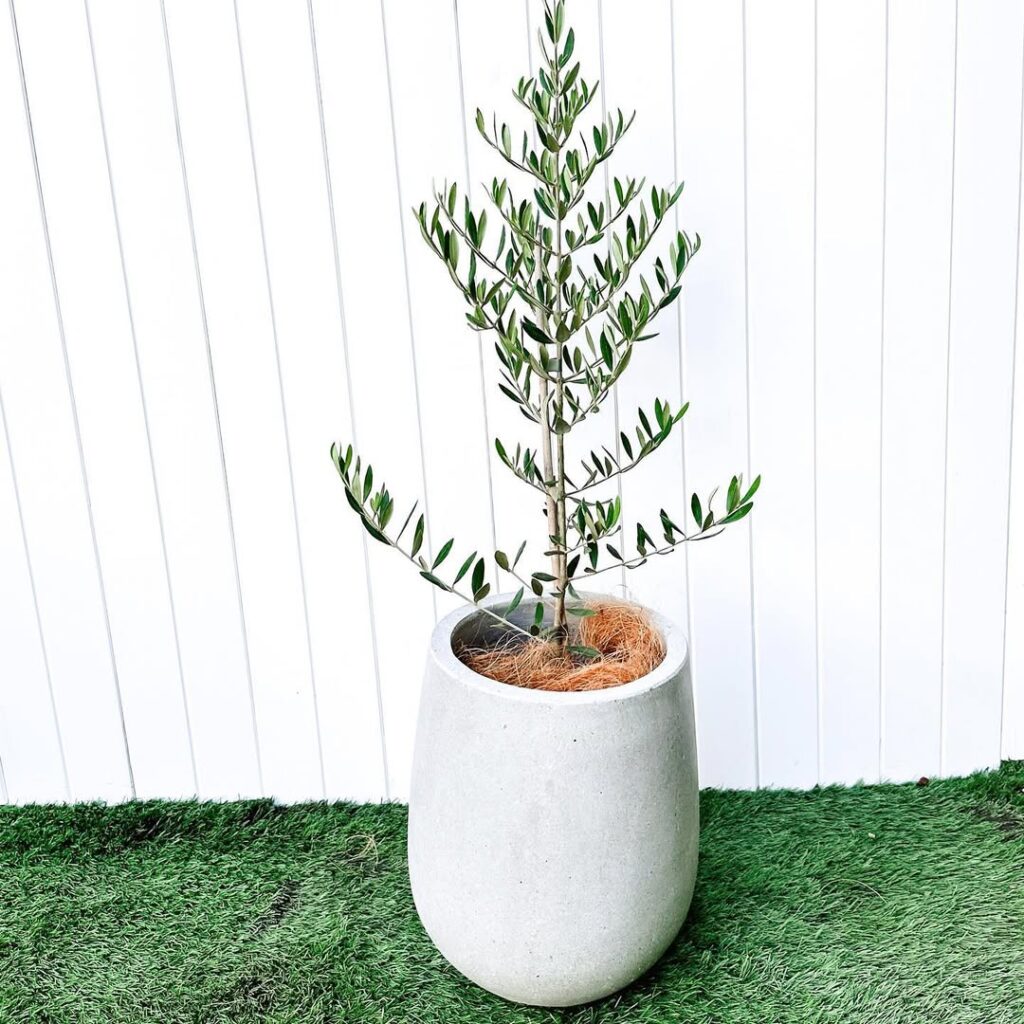
The Dwarf Olive Tree brings timeless Mediterranean charm to urban balcony spaces, growing to a manageable height of 4-6 feet when container-grown. With its silvery-green leaves, gnarled trunk, and potential to produce edible fruits, this compact variety offers the classic beauty of traditional olive trees in a space-saving format. Its slow growth rate and tolerance for pruning make it particularly suitable for balcony cultivation, while its drought-resistant nature and evergreen foliage provide year-round visual interest.
- Light: Requires full sun, minimum 6-8 hours of direct sunlight daily
- Water: Drought-tolerant; water deeply when top 2 inches of soil dry out; avoid overwatering
- Soil: Well-draining, slightly alkaline soil with pH 6.5-8.0
- Temperature: Hardy in zones 8-11; protect from frost; ideal temperature range 60-80°F
- Humidity: Tolerates low humidity; prefers dry conditions
- Container: Large pot with adequate drainage holes; minimum 24 inches deep
- Fertilizer: Light feeding with balanced fertilizer in spring and summer
- Air Circulation: Benefits from good air movement to prevent fungal issues
Star Magnolia: Fragrant Blooms for Your Urban Retreat
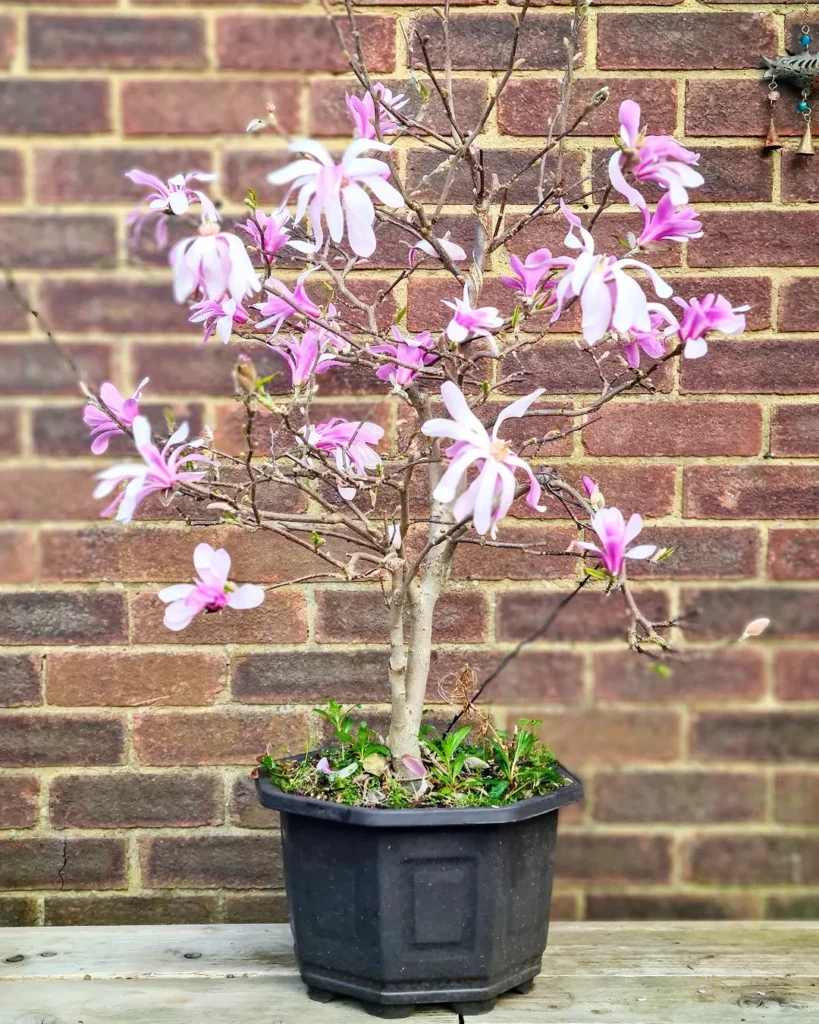
The Star Magnolia (Magnolia stellata) is a compact flowering tree that brings elegance and fragrance to balcony spaces. This deciduous tree produces stunning star-shaped white blooms in early spring before its leaves emerge, creating a dramatic display that transforms any urban outdoor area. Growing to a manageable height of 6-12 feet when mature, it can be successfully maintained in containers while providing seasonal interest with its flowers, summer foliage, and winter silhouette.
- Light: Partial to full sun; morning sun with afternoon shade is ideal
- Water: Regular watering to maintain consistently moist soil; do not let soil dry out completely
- Soil: Rich, well-draining acidic soil with high organic content
- Temperature: Hardy in zones 4-9; protect from harsh winds
- Container: Large pot with adequate drainage holes
- Fertilizer: Feed with slow-release fertilizer in spring and summer
- Pruning: Light pruning after flowering to maintain shape and size
- Humidity: Moderate humidity levels; benefits from occasional misting
- Winter Care: Protect roots from freezing by insulating container
Italian Cypress: Vertical Drama for Modern Balconies
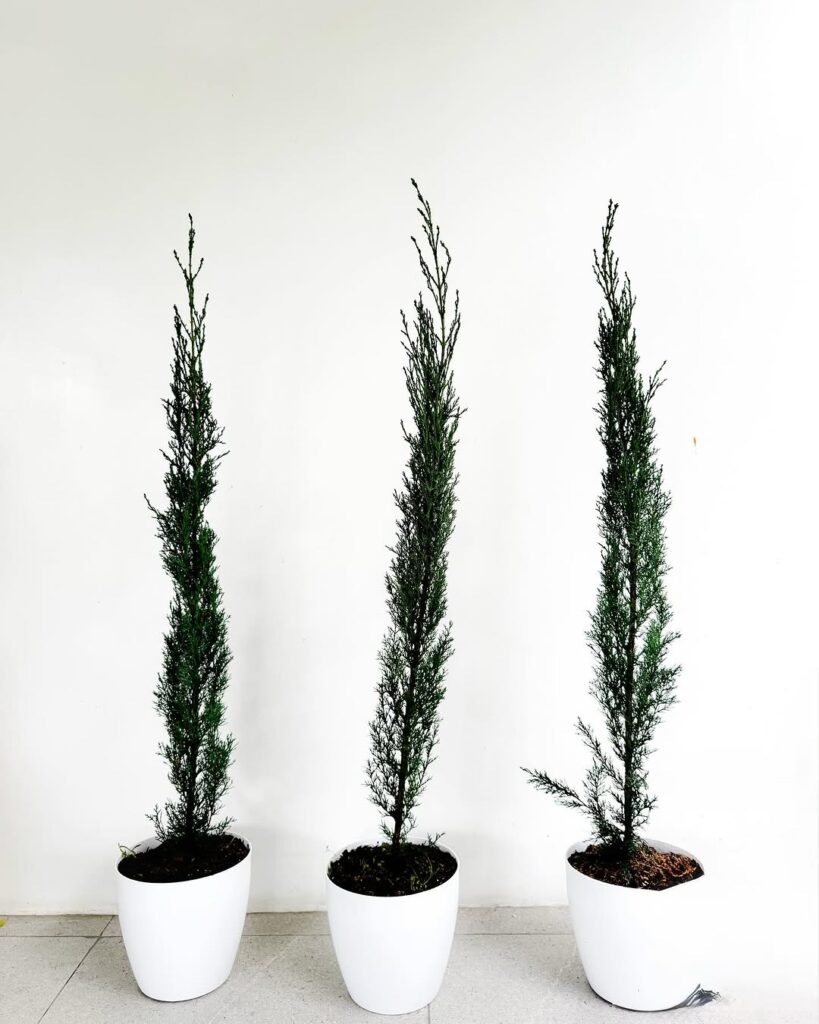
Italian Cypress trees are striking columnar evergreens that add dramatic vertical interest to balcony spaces without consuming excessive floor area. These slender, towering trees naturally grow in a tight, upright form that can reach heights of 40-60 feet in the ground but remain manageable in containers. Their dark green, dense foliage creates a bold architectural statement that works particularly well in modern and Mediterranean-style balcony designs, while also providing privacy screening and windbreak benefits.
- Light: Full sun; minimum 6-8 hours of direct sunlight daily
- Water: Moderate; water deeply when top 2-3 inches of soil feels dry
- Soil: Well-draining, slightly alkaline soil with pH 6.6-8.0
- Temperature: Hardy in zones 7-10; prefers warm climates
- Container: Deep containers with excellent drainage
- Fertilizer: Light feeding with balanced fertilizer in spring and summer
- Humidity: Tolerates both dry and humid conditions
- Space: Minimum 2 feet width spacing between trees
- Pruning: Minimal; maintain shape with light trimming in spring
Dwarf Cherry Blossom: Spring’s Most Graceful Performance
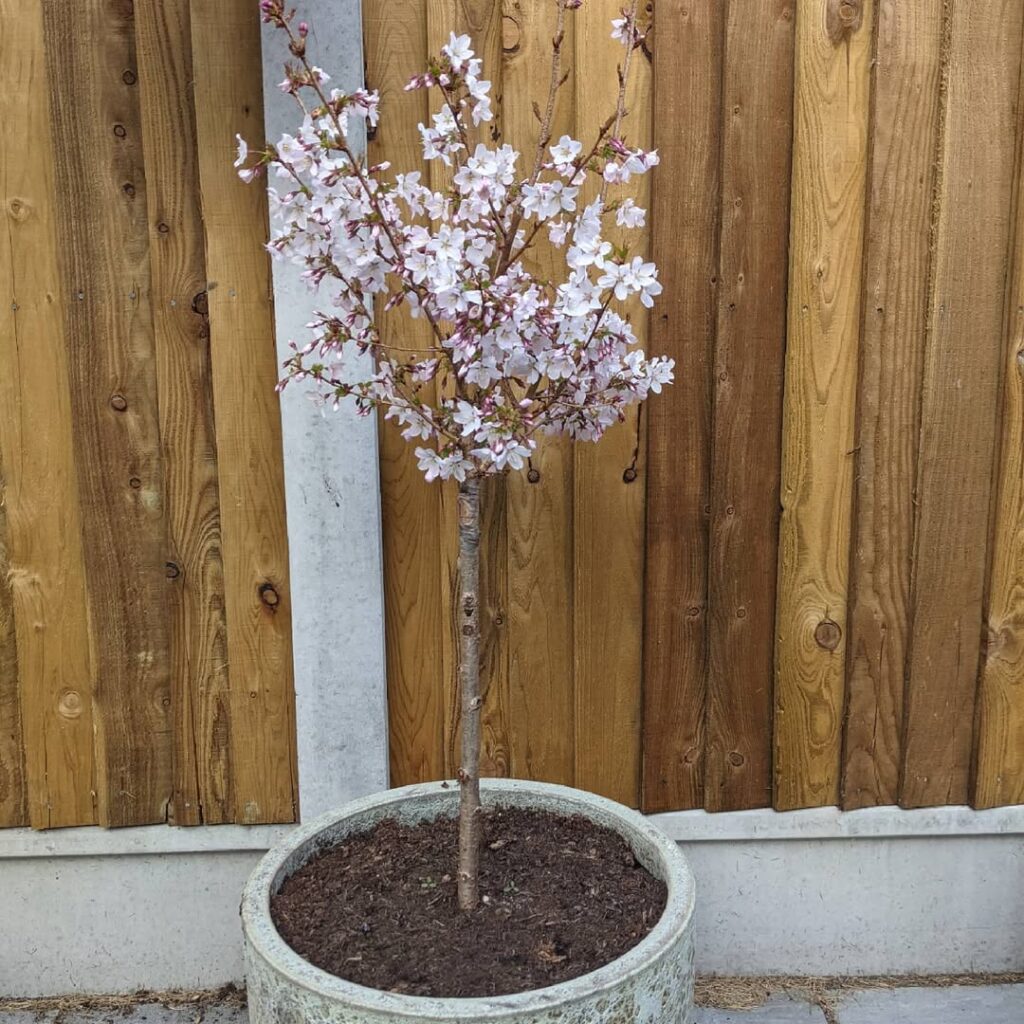
The Dwarf Cherry Blossom tree offers a spectacular spring display in a compact form perfect for balcony gardens. These miniature versions of their larger cousins typically grow 6-8 feet tall and produce abundant pink or white blossoms in early spring, followed by small ornamental fruits. Their graceful branching pattern and delicate flowers create an enchanting focal point, while their manageable size makes them ideal for container growing in limited spaces.
- Light: Full sun to partial shade, minimum 6 hours of direct sunlight daily
- Water: Regular watering schedule, keeping soil consistently moist but not waterlogged
- Soil: Well-draining, slightly acidic soil with pH 6.0-7.0
- Temperature: Hardy in zones 5-8, prefers temperatures between 60-75°F
- Container: Large pot (at least 24 inches deep) with adequate drainage holes
- Fertilizer: Balanced, slow-release fertilizer in early spring and mid-summer
- Pruning: Light pruning after flowering to maintain shape and size
- Humidity: Moderate humidity levels, benefits from occasional misting in dry conditions
Bay Laurel: The Culinary Crown Jewel
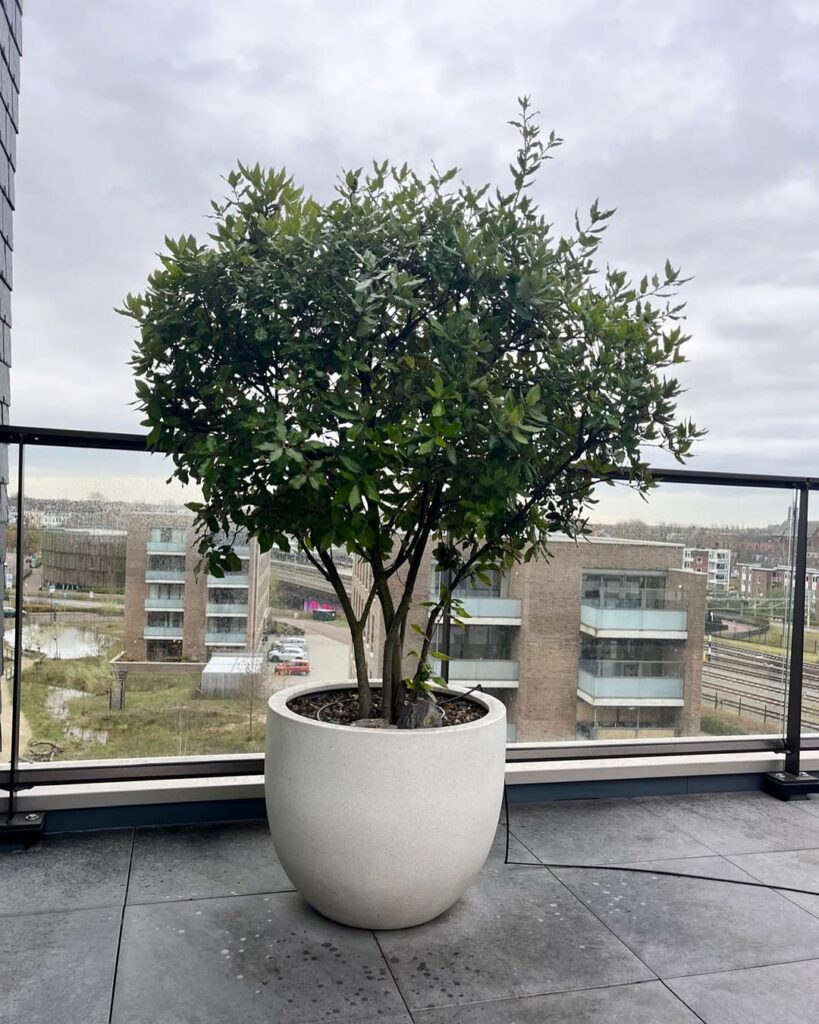
Bay Laurel is a sophisticated evergreen tree that makes an excellent choice for balcony gardens, prized for both its ornamental value and culinary applications. Its glossy, dark green leaves are a staple in Mediterranean cooking, adding depth to soups, stews, and marinades. When grown in containers, bay laurel maintains a manageable size through regular pruning, typically reaching 4-6 feet tall, and its naturally pyramidal shape creates an elegant focal point while providing fresh herbs year-round.
- Light: Bright, direct sunlight for 6-8 hours daily; tolerates partial shade but grows best in full sun
- Water: Moderate watering; allow top inch of soil to dry between waterings; avoid waterlogged soil
- Soil: Well-draining, slightly acidic potting mix with pH 6.0-7.0
- Temperature: Prefers 45-80°F; protect from frost and harsh winds
- Humidity: Adaptable to various humidity levels; benefits from occasional misting
- Container: Deep pot with adequate drainage holes; minimum 12 inches diameter
- Fertilizer: Light feeding with balanced fertilizer every 2-3 months during growing season
Chinese Bamboo: Creating Natural Privacy Screens
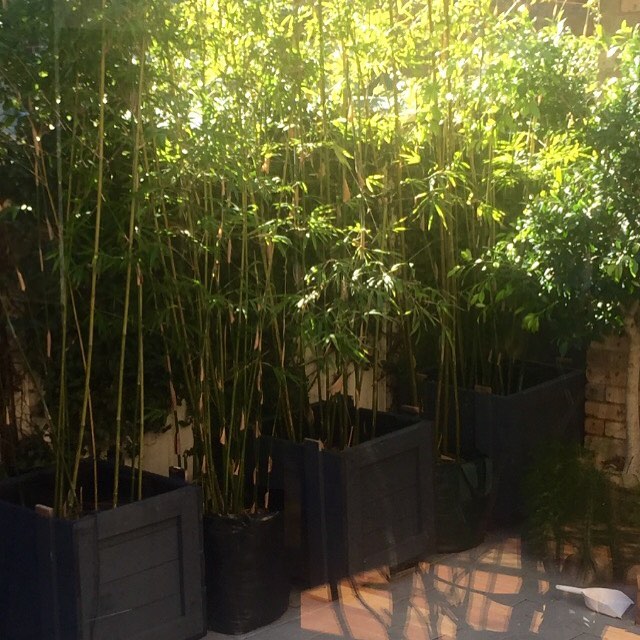
Chinese bamboo is an excellent choice for balcony privacy screens due to its rapid growth, dense foliage, and vertical habit. These tall, graceful plants can reach heights of 20-30 feet in favorable conditions, though container growing naturally limits their size. The evergreen canes and delicate leaves create an effective natural barrier while adding an exotic, zen-like aesthetic to the balcony space.
- Light: Partial to full sun; morning sun with afternoon shade is ideal
- Water: Regular watering to maintain consistently moist soil; avoid waterlogging
- Soil: Well-draining, rich, slightly acidic soil with pH 6.0-6.5
- Temperature: 65-85°F (18-29°C)
- Humidity: Moderate to high humidity levels
- Container: Deep pots with adequate drainage holes
- Fertilizer: Monthly feeding during growing season with balanced fertilizer
- Spacing: 3-5 feet between plants for privacy screening
Dwarf Eucalyptus: Contemporary Appeal With Aromatic Benefits
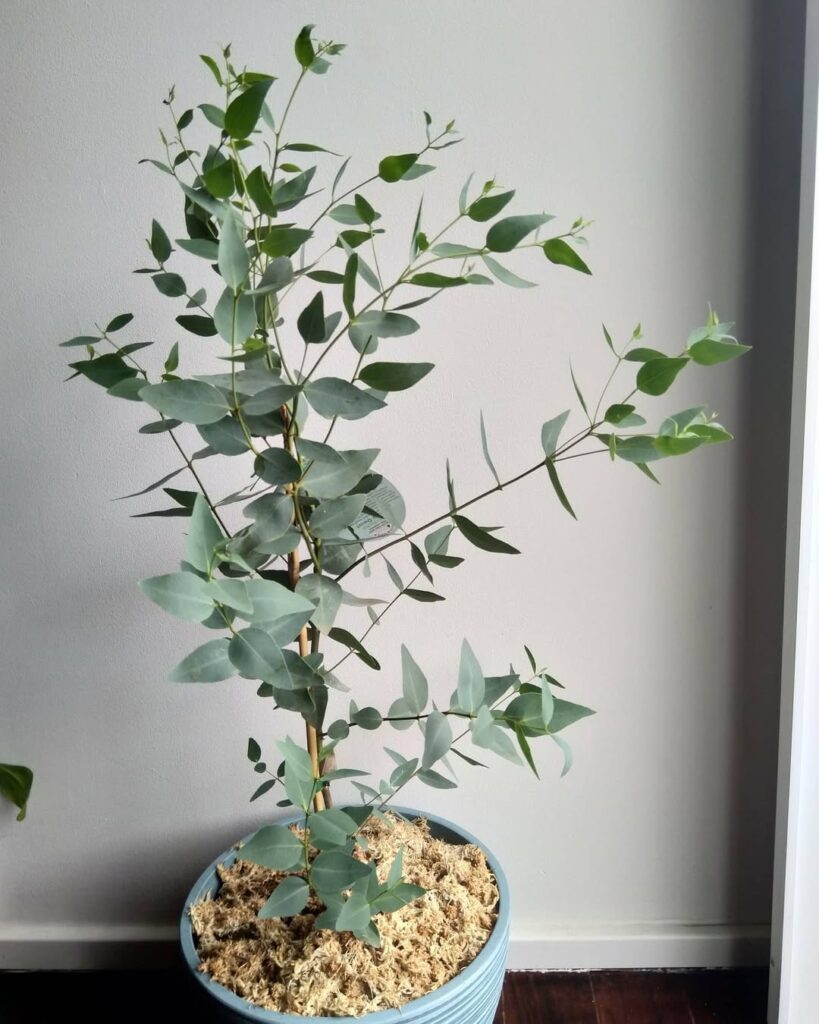
Dwarf Eucalyptus varieties offer an attractive modern aesthetic for balcony gardens while providing the signature eucalyptus fragrance in a compact form. These smaller varieties typically grow 6-10 feet tall when container-grown, featuring silvery-blue foliage and smooth, peeling bark that adds visual interest. The aromatic oils released from their leaves not only create a pleasant atmosphere but also have natural insect-repelling properties, making them practical additions to outdoor living spaces.
- Light: Full sun to partial shade; minimum 6 hours direct sunlight daily
- Water: Moderate watering; allow soil to dry slightly between waterings
- Soil: Well-draining, slightly acidic potting mix with pH 5.5-6.5
- Temperature: Hardy in zones 8-11; protect from frost
- Container: Large pot with drainage holes; minimum 24 inches deep
- Fertilizer: Light feeding during growing season with balanced fertilizer
- Humidity: Tolerates both dry and humid conditions
- Air Circulation: Good airflow needed to prevent fungal issues
Kumquat Tree: Petite Citrus Charm Year-Round
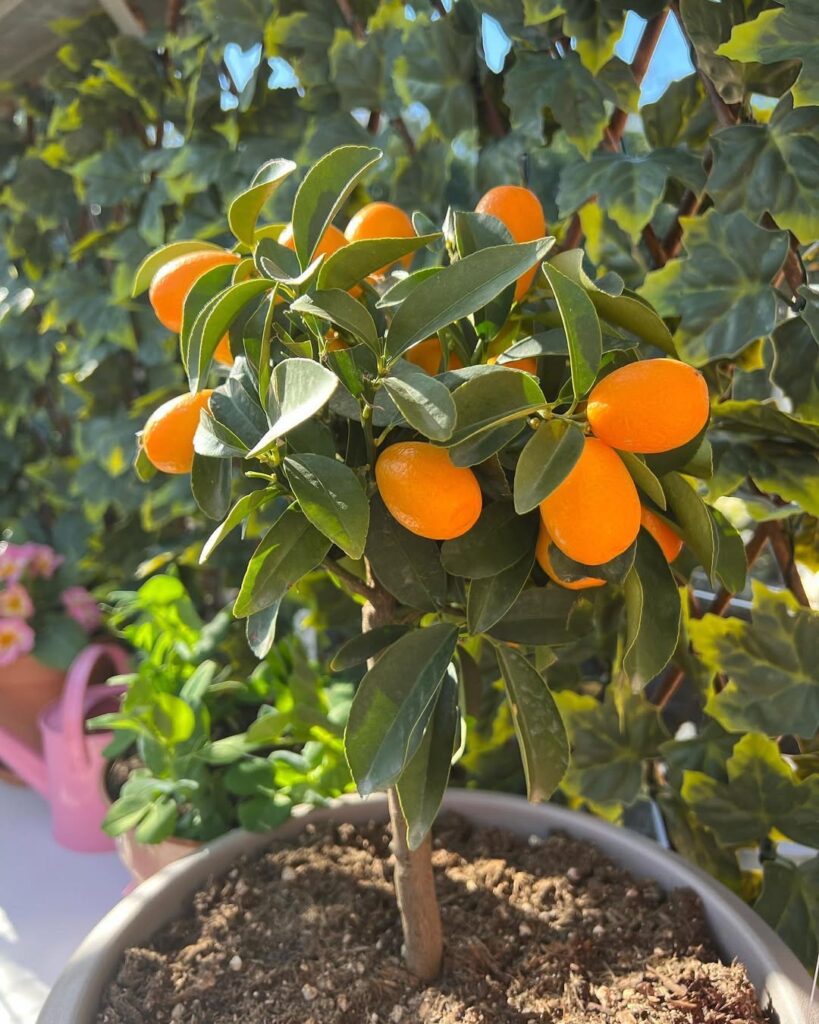
The kumquat tree is a miniature citrus variety perfectly suited for balcony gardening, typically reaching heights of 4-8 feet when container-grown. This compact evergreen produces small, oval-shaped fruits that can be eaten whole, including the sweet rind and tart flesh. Unlike most citrus trees, kumquats are particularly cold-hardy and can withstand brief temperature drops to 18°F (-8°C). The tree provides year-round interest with glossy dark green foliage, fragrant white blossoms in spring, and bright orange fruits that typically mature in late fall to winter.
- Light: Full sun (6-8 hours daily); some afternoon shade in extremely hot climates
- Water: Moderate, consistent moisture; allow top inch of soil to dry between waterings
- Soil: Well-draining, slightly acidic citrus mix (pH 6.0-6.5)
- Container: Large pot (15-20 gallons) with adequate drainage holes
- Temperature: Ideal range 65-85°F (18-29°C)
- Humidity: Moderate to high; benefits from regular misting
- Fertilizer: Monthly feeding with balanced citrus fertilizer during growing season
- Winter Care: Move to protected area when temperatures drop below 25°F (-4°C)
